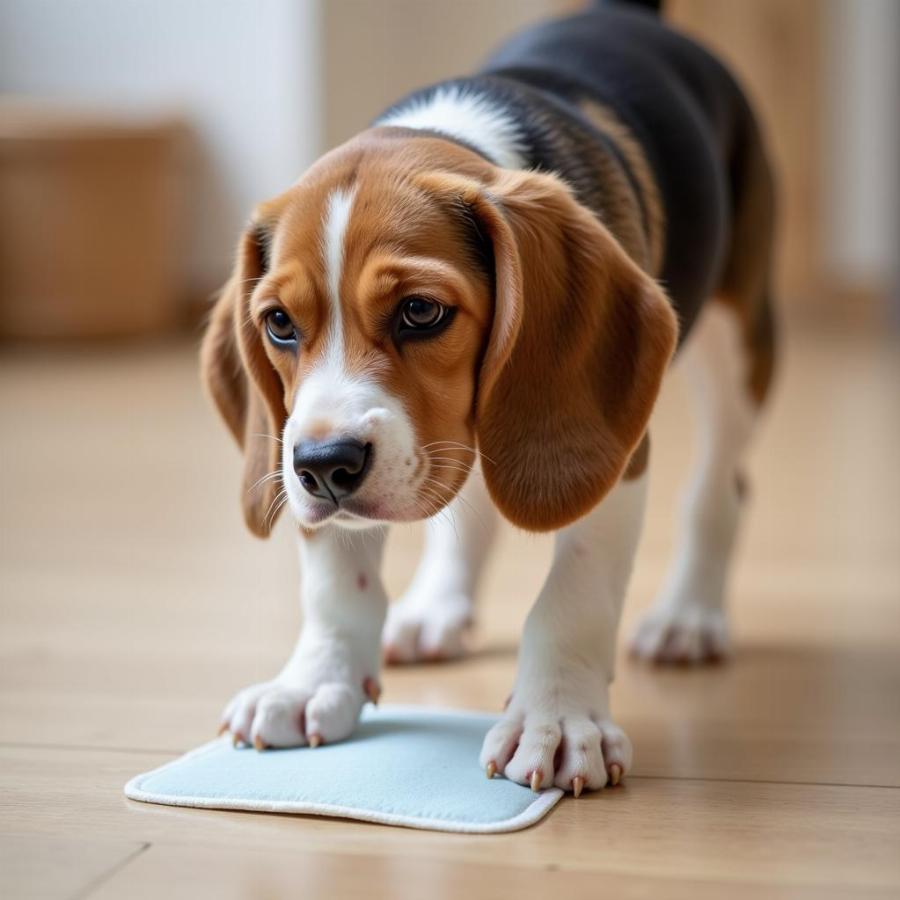Having your dog urinate on you can be an incredibly frustrating and puzzling experience. After all, aren’t dogs supposed to shower their loved ones with affection, not pee? Rest assured, there’s a reason behind this unwelcome behavior, and it’s rarely a sign of defiance. Let’s delve into the common reasons why dogs might pee on their humans and explore how to address this issue effectively.
Medical Reasons for Dog Urination
Before assuming your dog is marking their territory on you (don’t worry, we’ll get to that!), it’s crucial to rule out any underlying medical conditions.
- Urinary Tract Infections (UTIs): Just like humans, dogs can suffer from UTIs, causing discomfort and frequent urination.
- Incontinence: Older dogs, especially, can develop incontinence, making it difficult to control their bladder.
- Other Medical Conditions: Diabetes, kidney disease, and even certain medications can lead to increased urination or changes in bladder control.
Expert Insight: “If your dog suddenly starts peeing on you or exhibits other unusual urinary habits, it’s essential to consult a veterinarian to rule out any medical issues,” advises Dr. Emily Parker, a certified veterinarian with over 15 years of experience.
Behavioral Reasons for Dog Urination
If your vet gives your furry friend a clean bill of health, the reason for the unwanted urination likely stems from behavioral issues. Here are some common culprits:
## Submissive Urination: A Sign of Anxiety
Submissive urination is often seen in puppies and shy or anxious dogs. When your dog feels scared, stressed, or overly excited, they might urinate as a way of showing deference or appeasement.
How to recognize it: Your dog might exhibit submissive body language, such as cowering, tucking their tail, flattening their ears, or even rolling onto their back.
What to do: Avoid punishing your dog, as this will only exacerbate their anxiety. Instead, focus on building their confidence through positive reinforcement training.
## Excitement Urination: Overwhelmed by Joy
Some dogs, especially puppies, simply get so excited that they can’t control their bladders. Think greeting you at the door, meeting new people, or playtime in the park.
How to recognize it: Unlike submissive urination, excitement urination is usually accompanied by enthusiastic tail wags, jumping, and playful behavior.
What to do: Try to keep greetings low-key and redirect your dog’s energy to a more appropriate outlet, such as a quick training session or a game of fetch.
## Marking Territory: Sending a Message
While less common for dogs to mark their territory on their humans, it’s not unheard of. This behavior is more likely if you have multiple dogs in the household or if your dog feels insecure or anxious.
How to recognize it: Dogs might urinate on objects or areas that carry your scent, such as your bed, clothing, or even you!
What to do: Neutering or spaying your dog can help reduce marking behavior. Additionally, focus on obedience training, reinforcing positive interactions, and providing a stable and secure environment.
## Lack of Proper Housetraining: An Accident Waiting to Happen
If your dog hasn’t been properly housetrained, they might simply not understand that urinating inside is unacceptable.
How to recognize it: This type of urination can occur in various locations and isn’t necessarily directed at you specifically.
What to do: Establish a consistent housetraining routine, reward your dog for pottying outside, and thoroughly clean any accidents with an enzymatic cleaner to eliminate odors.
 Dog Being Housetrained
Dog Being Housetrained
Conclusion: Addressing the Issue with Patience and Understanding
Dealing with a dog that pees on you requires patience, understanding, and a multi-faceted approach. Start by ruling out any underlying medical conditions with a visit to your veterinarian. If medical issues are ruled out, focus on addressing the underlying behavioral causes through positive reinforcement training, environmental management, and building your dog’s confidence. Remember, consistency and patience are key!
FAQs:
Q: My dog used to be housetrained but has started peeing in the house again. Why?
A: Regression in housetraining can occur for various reasons, including medical conditions, stress, changes in routine, or simply forgetting their training.
Q: Can I use punishment to stop my dog from peeing on me?
A: Never use punishment, as this will only make the problem worse. Focus on positive reinforcement and addressing the underlying cause of the behavior.
Need More Help?
For personalized advice and guidance on dealing with dog urination issues, contact the experts at Beaut Dogs at [email protected]. We’re here to help you navigate the wonderful world of dog ownership!